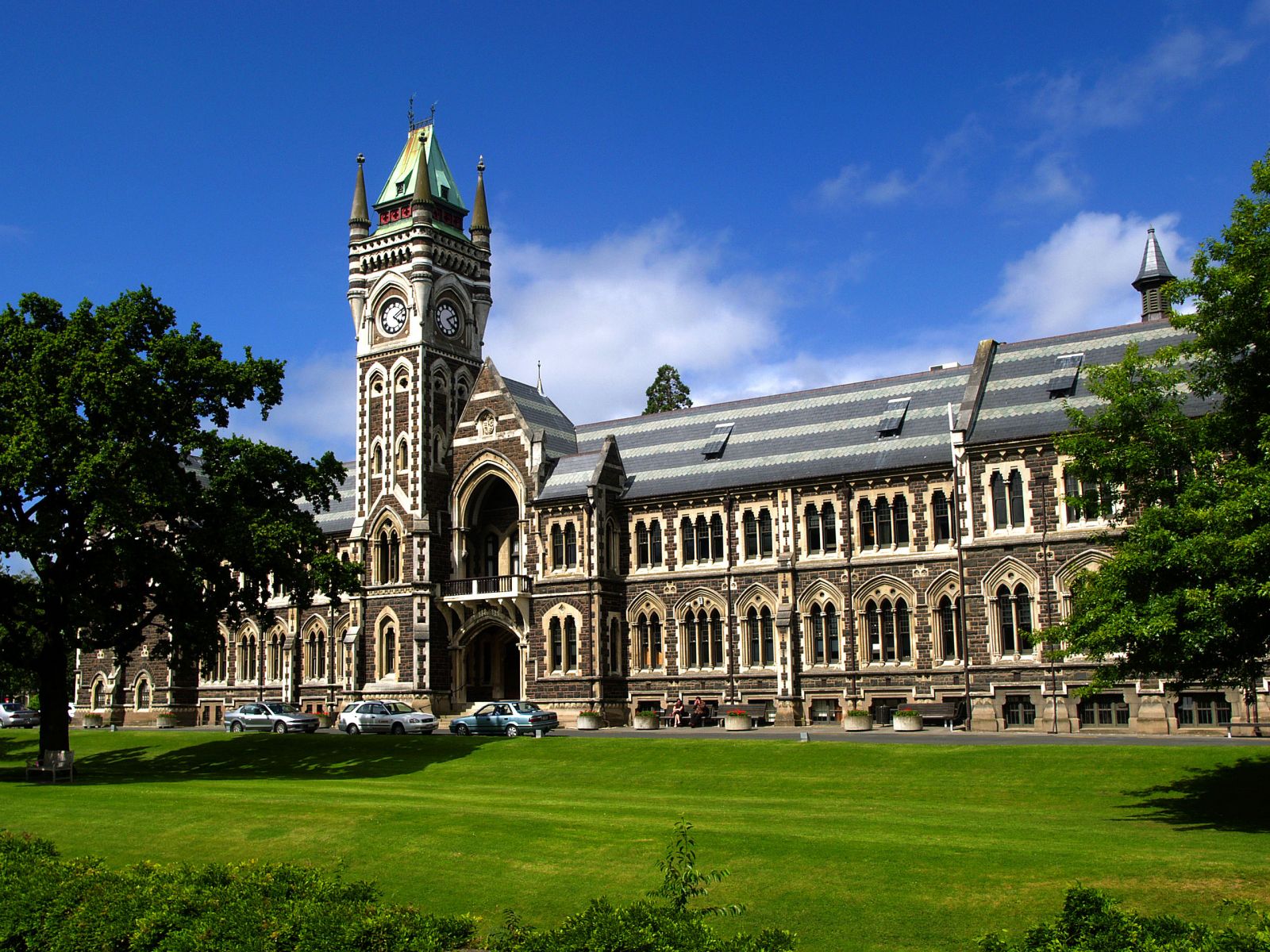- Study in AustraliaAustralian Universities/CollegesPrograms by faculty AusAustralian VisasLife in Australia
- Study In New ZealandNew Zealand UniversitiesPrograms by Faculty NZNew Zealand VisasLife in New Zealand
- Study in CanadaUniversities/Colleges in CANADAPrograms by faculty CanadaCanadian VisasLife in Canada
Otago University
The University of Otago
The University of Otago, founded in 1869 by an ordinance of the Otago Provincial Council, is New Zealand’s oldest university. The new University was given 100,000 acres of pastoral land as an endowment and authorised to grant degrees in Arts, Medicine, Law and Music.
The University opened in July 1871 with a staff of just three Professors, one to teach Classics and English Language and Literature, another having responsibility for Mathematics and Natural Philosophy, and the third to cover Mental and Moral Philosophy and Political Economy. The following year a Professor of Natural Science joined the staff. With a further endowment provided in 1872, the syllabus was widened and new lectureships established: lectures in Law started in 1873, and in 1875 courses began in Medicine. Lectures in Mining were given from 1872, and in 1878 a School of Mines was established.
The University was originally housed in a building (later the Stock Exchange) on the site of John Wickliffe House in Princes Street but it moved to its present site with the completion of the northern parts of the Clocktower and Geology buildings in 1878 and 1879.
The School of Dentistry was founded in 1907 and the School of Home Science (later Consumer and Applied Sciences) in 1911. Teaching in Accountancy and Commerce subjects began in 1912. Various new chairs and lectureships were established in the years between the two world wars, and in 1946 teaching began in the Faculty of Theology. The School of Physical Education was opened in 1947.
A federal University of New Zealand was established by statute in 1870 and became the examining and degree-granting body for all New Zealand university institutions until 1961. The University of Otago had conferred just one Bachelor of Arts degree, on Mr Alexander Watt Williamson, when in 1874 it became an affiliated college of the University of New Zealand. In 1961 the University of New Zealand was disestablished, and the power to confer degrees was restored to the University of Otago by the University of Otago Amendment Act 1961.
Since 1961, when its roll was about 3,000, the University has expanded considerably (in 2010 there were about 21,000 students enrolled) and has broadened its range of qualifications to include undergraduate programmes in Surveying, Pharmacy, Medical Laboratory Science, Education, Physiotherapy, Applied Science, Dental Technology, Medical Radiation Therapy, Dental Hygiene and Dental Therapy (now combined in an Oral Health programme), and Biomedical Sciences, as well as specialised postgraduate programmes in a variety of disciplines.
Although the University’s main campus is in Dunedin, it also has Health Sciences campuses in Christchurch (University of Otago, Christchurch) and Wellington (University of Otago, Wellington) (established in 1972 and 1977 respectively), and an information and teaching centre in central Auckland (1996). The Dunedin College of Education merged with the University on 1 January 2007, and this added a further campus in Invercargill.

Departments and Schools
Academic Departments and Schools at the University of Otago are divided into four academic divisions. Many departments and schools teach subjects and papers specific to their area of expertise. Staff from many academic departments also teach in subjects and papers from other academic areas.
School of Business Departments
The School of Business is housed in the purpose-built Commerce Building. The School teaches major subjects for the BCom degree as well as many postgraduate diplomas and degrees including the MBA programme.
Division of Health Sciences Departments
The Division of Health Sciences consists of the Faculty of Medicine, which administers the School of Medical Sciences and three clinical Schools of Medicine located in Christchurch, Dunedin and Wellington, and the Schools of Dentistry, Pharmacy and Physiotherapy.
Division of Humanities Departments
The Division of Humanities at Otago is one of the most innovative and progressive in New Zealand. Humanities cover the major fields of the Arts and Social Sciences. The Division consists of 15 departments and includes professional programmes in Law, Education, and Social Work.
Division of Sciences Departments
The Division of Sciences is responsible for a full range of sciences including degree programmes in Consumer and Applied Sciences, Physical Education, and Surveying. The Division is a leader in many areas of genetic research and computer and information technology.
Accommodation for International Students
The International Office provides a guarantee of accommodation placement services to all international students who receive an academic offer. There are several accommodation options for international students and it is important to consider whether you prefer an independent lifestyle or enjoy living in a community.
The Accommodation Office staff look after the application process for University Managed Accommodation. Once international students have received an offer of an academic place, their accommodation application will be forwarded to their first preference for consideration. If your first choice of accommodation is not available, the University will offer you an alternative where possible. More detailed information:
- Aquinas College (under 18 year olds)
- Residential Colleges
- University Flats (University managed flats/houses)
- Accommodation Costs
International students who are accepted for a residential college are expected to be active participants in the social, cultural and recreational programmes organized by the residents' association.
For more information, please contact one of our offices
Study in Australia | Study in the UK | Study in Malaysia | Study in Canada | Study in the USA | Study in New Zealand













